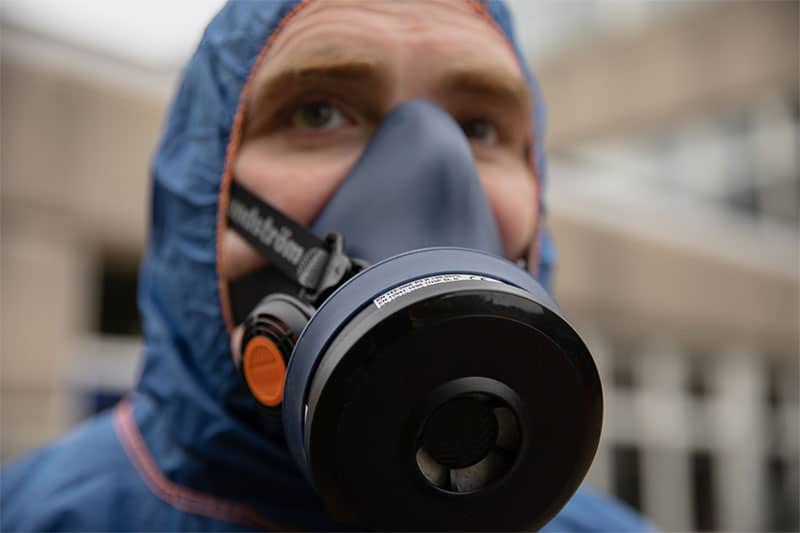What are the current Control of Asbestos Regulations 2012 (CAR 2012)?
Today, it is widely understood just how critically important it is to manage asbestos-containing materials (ACMs) in a safe and responsible manner in order to prevent harm to human health, and the associated human, financial, and legal impacts arising from this. The current stringent rules in relation to controlling and managing asbestos play a central role in ensuring this.
Asbestos may be a naturally occurring mineral that was first commercially mined in the late 19th century, but it is also a notorious carcinogen. The inhalation or ingestion of asbestos fibres is linked to a heightened risk of developing certain potentially fatal diseases, such as mesothelioma or asbestos-related lung cancer, in later life – possibly many decades after the instance of exposure occurred.
In the 2020s, when most people casually talk about the “asbestos regulations”, they tend to be referring to the Control of Asbestos Regulations 2012, also known as CAR 2012. This overarching asbestos legislation puts in place requirements for “dutyholders” – typically those responsible for maintenance and/or repairs at a given non-domestic premises – to carry out certain actions, in order to control and manage the asbestos risk on their sites.
What is the legislation history and enforcement date of the Control of Asbestos Regulations 2012?
With CAR 2012 having come into force more than a decade ago now – on 6th April 2012 – it would be very easy to overlook that the UK’s history of regulating asbestos goes back many generations, even far pre-dating the moment in late 1999 when the use of asbestos in the UK was banned altogether.
CAR 2012, after all, constituted an update of, and replacement for, the previous 2006 version of the Regulations. The Control of Asbestos Regulations 2006 had, in turn, combined various existing pieces of UK asbestos law – including the Control of Asbestos at Work Regulations 2002, the Asbestos (Licensing) Regulations 1983, and the Asbestos (Prohibitions) Regulations 1992, and all their respective amendments – into a single set of asbestos regulations.
Although the differences between CAR 2006 and CAR 2012 are fairly limited, there are nonetheless some changes worth noting. These include certain types of non-licensable asbestos work (in other words, asbestos work for which a licence from the Health and Safety Executive, or HSE, is not required) now having additional requirements in relation to the notification of work; the designation of areas where work on asbestos is being undertaken; medical surveillance; and record keeping.
As aforementioned, the importation and use of all forms of asbestos in the UK was finally banned in 1999. Prior to this, there were various landmark developments in how asbestos was regulated in the UK.
Those milestones included the introduction of the Asbestos (Prohibitions) Regulations 1985, which banned the import of blue and brown asbestos into the UK, as well as the Health and Safety at Work etc Act 1974, and the Asbestos Regulations 1969. The latter, which came into effect in 1970, put in place much stricter requirements than the earlier 1931 Regulations did, and applied to a significantly greater amount of asbestos work.
Who do the regulations apply to?
The Control of Asbestos Regulations 2012 cover an extremely wide range of areas and requirements in relation to the control and management of asbestos-containing materials (ACMs). The various sections of the legislation encompass such vital aspects as the “duty to manage” asbestos in non-domestic premises, the identification of the presence of asbestos, the licensing of work with asbestos, the prevention or reduction of exposure to asbestos, and much more.
CAR 2012 applies to employers, employees, and those who manage the maintenance of non-domestic premises. This legislation sets out a duty to protect oneself and others from being exposed to asbestos at work, even when that work is being carried out in domestic buildings; Regulations 5 and 6 address this in detail.
A crucial element of CAR 2012 to be aware of is the “duty to manage” asbestos in non-domestic premises; this is explained under Regulation 4. The aim of this part of the legislation is to help ensure dutyholders – in other words, those in charge of the maintenance of non-domestic premises – carry out the actions necessary to control the risks ACMs may pose in their buildings.
What is the scope of application of CAR 2012?
It is worth emphasising that CAR 2012 really does apply to all non-domestic establishments where asbestos could be present. So, it is not only specific sectors or certain organisations that need to comply; whether the premises for which you are a dutyholder is a commercial, industrial, or public structure such as a school, hospital, office building, or retail store, you will need to adhere to the requirements set out by CAR 2012.
If you are the dutyholder for a non-domestic building that was constructed or renovated prior to the year 2000 – a time when asbestos was legal to use in the UK construction industry – you will need to be especially vigilant in light of the high probability of your building containing ACMs. You will therefore need to ensure steps are taken to identify and locate any such asbestos that is present at your site, so that you can make informed decisions on how to manage these materials.
What are the key provisions and requirements of CAR 2012?
As aforementioned, a major provision of CAR 2012 is the “duty to manage” asbestos in a given non-domestic property. The dutyholder is expected, under Regulation 4, to:
- Take reasonable steps to determine whether there are asbestos-containing materials (ACMs) in the property – and if so, they are obliged to gather information about the location, amount, and condition of these materials
- Presume that all materials in the property contain asbestos, unless there is strong evidence of this not being the case
- Put together, and keep up to date, an asbestos management plan
- Regularly review and monitor the asbestos management plan
- Provide details about the location and condition of the ACMs to anyone who is likely to disturb or work on these materials
There is a wide range of other regulations contained within CAR 2012, that set out detailed obligations in relation to the management of ACMs. There is information, for example, about:
- Risk assessment: an employer must not undertake work that is liable to expose its employees to asbestos unless a suitable and efficient risk assessment has been carried out, and suitable steps then taken in response to the outcome of the assessment
- Plans of work: an employer must not carry out any work with asbestos unless it has first prepared a suitable written plan of work outlining how the work is to be done
- Licensing of work: although a licence from the HSE isn’t legally required for all forms of asbestos work, the employer must hold such a licence prior to carrying out any asbestos work that is licensable
- Notification requirements: Regulation 9 of CAR 2012 makes clear that employers must notify the appropriate licensing authority of proposed work which is either licensable (always notifiable) or notifiable non-licensed work, also referred to as “NNLW” (with this term being applicable to some non-licensable work)
- Information, instruction, and training: every employer is required to ensure that any worker it employs is given adequate information, instruction, and training where that employee is liable to be exposed to asbestos, or if that employee supervises such employees
- The prevention or reduction of asbestos exposure: every employer must prevent any of its employees from being exposed to asbestos, so far as is reasonably practicable
- The use of control measures: every employer who provides any control measure is required to take all reasonable steps to ensure it is properly used or applied as the case may be. Every employee, meanwhile, is required to make full and proper use of any control measure.
We have previously written extensively here at Oracle Solutions on how, in your capacity as a dutyholder, you can help ensure your compliance with the latest asbestos regulations. The HSE also makes available an Approved Code of Practice (ACOP) and guidance document, Managing and working with asbestos: Control of Asbestos Regulations 2012, which sets out easy-to-understand, practical explanations of how you can comply with CAR 2012’s provisions.
What are the compliance and penalty considerations of CAR 2012?
To give an example of the legal risks you could be taking in the event that you don’t familiarise yourself with and make efforts to comply with CAR 2012, we would remind you that one element of the “duty to manage” asbestos is the need to create, and keep up to date, an asbestos management plan.
If you don’t have a plan in place to deal with asbestos at your premises, and/or you do not put such a plan into action, you could be running the risk of being fined as much as £20,000, or imprisoned for up to 12 months. In the case of serious breaches of the asbestos regulations, an unlimited fine can be handed down to the guilty party, and/or a prison sentence of as long as two years.
Conclusion: never underestimate the importance of achieving CAR 2012 compliance
Hopefully, the above guidance will have helped you feel a lot more informed about what the Control of Asbestos Regulations 2012 are, why these regulations exist, who they apply to, and what you can do to ensure your own compliance as a dutyholder, employer, or even employee.
Achieving consistent compliance with CAR 2012’s requirements is not only important because of the need for affected parties to avoid legal risks. That’s because adhering to this regulation is also crucial for minimising the risk of anyone who works at or otherwise uses your premises imperilling their health by breathing in or ingesting asbestos.
Would you like to learn more about Oracle Solutions’ wide-ranging, licensed, and accredited asbestos services, encompassing asbestos surveying, training, management, and so many more vital processes? If so, you are welcome to email or call us to receive your free and fast quote.

Written by Jess Scott
Jess Scott has been an all-round asbestos consultant since 1996. That’s nearly 3 decades of asbestos knowledge. He spends his time sharing that knowledge with the team at Oracle and with their clients. Jess's goal is, and always has been, to use my expertise in helping people to comply with the law. This legal compliance ultimately helps to protect everyone from the harmful effects of asbestos. Jess has acted as an asbestos expert witness in legal cases and is involved in many asbestos educational activities throughout the UK.

